
Gilbert Scott-Heron was an American jazz poet, singer, musician, and author known for his work as a spoken-word performer in the 1970s and 1980s. His collaborative efforts with musician Brian Jackson fused jazz, blues, and soul with lyrics relative to social and political issues of the time, delivered in both rapping and melismatic vocal styles. He referred to himself as a "bluesologist", his own term for "a scientist who is concerned with the origin of the blues". His poem "The Revolution Will Not Be Televised", delivered over a jazz-soul beat, is considered a major influence on hip hop music.
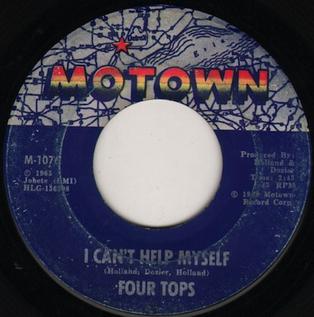
"I Can't Help Myself (Sugar Pie Honey Bunch)" is a 1965 song recorded by the Four Tops for the Motown label.
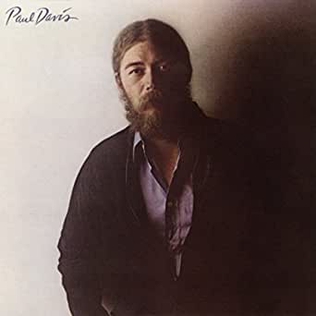
Paul Lavon Davis was an American singer and songwriter, best known for his radio hits and solo career that started worldwide in 1970. His career encompassed soul, country, and pop. His most successful songs are 1977's "I Go Crazy", a No. 7 pop hit that once held the record for the longest chart run on the Billboard Hot 100, and 1982's "'65 Love Affair", which at No. 6 is his highest-charting single. Another pop hit, "Cool Night", was released in 1981. In the mid-1980s, he also had two No. 1 country hits as a guest vocalist on songs by Marie Osmond and Tanya Tucker.
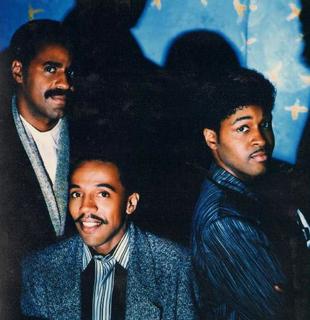
Surface was an American music group from New Jersey, active from 1983 to 1994. They are best known for their No. 1 pop and R&B hit "The First Time." During its heyday, the group consisted of singer/bassist Bernard Jackson, David Townsend, and David "Pic" Conley.

Brian Robert Jackson is an American keyboardist, flautist, singer, composer, and producer known for his collaborations with Gil Scott-Heron in the 1970s. The sound of Jackson's Rhodes electric piano and flute accompaniments featured prominently in many of their compositions, most notably on "The Bottle" and "Your Daddy Loves You" from their first official collaboration Winter in America.

From South Africa to South Carolina is a studio album by the American vocalist Gil Scott-Heron and the keyboardist Brian Jackson. It was released in November 1975 by Arista Records. Scott-Heron performed "Johannesburg" and "A Lovely Day" on Saturday Night Live in December 1975. The album was reissued in the late 1990s via Scott-Heron's Rumal-Gia label, distributed by TVT Records.

Pieces of a Man is the debut studio album by American poet Gil Scott-Heron. It was recorded in April 1971 at RCA Studios in New York City and released later that year by Flying Dutchman Records. The album followed Scott-Heron's debut live album Small Talk at 125th and Lenox (1970) and departed from that album's spoken word performance, instead featuring compositions in a more conventional popular song structure.

Winter in America is a studio album by American vocalist Gil Scott-Heron and keyboardist Brian Jackson. It was recorded in September to October 1973 at D&B Sound Studio in Silver Spring, Maryland and released in May 1974 by Strata-East Records. Scott-Heron and Jackson produced the album in a stripped-down fashion, relying on traditional African and R&B sounds, while Jackson's piano-based arrangements were rooted in jazz and the blues. The subject matter on Winter in America deals with the African-American community and inner city in the 1970s.
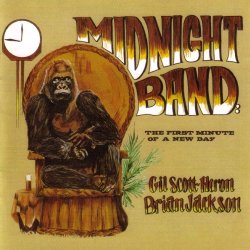
The First Minute of a New Day is an album by American vocalist Gil Scott-Heron, keyboardist Brian Jackson, and the Midnight Band—an eight-piece musical ensemble. It was released in January 1975 on Arista Records. Recording sessions for the album took place in the summer of 1974 at D&B Sound in Silver Spring, Maryland. It was the follow-up to Scott-Heron's and Jackson's critically acclaimed collaboration effort Winter in America. The First Minute of a New Day was the first album to feature "Winter in America", the title track of Scott-Heron's previous album which was not featured on its original LP release. The album was reissued on compact disc by Scott-Heron's label Rumal-Gia Records in 1998.
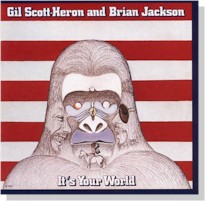
It's Your World is a studio album by American vocalist Gil Scott-Heron and keyboardist Brian Jackson, released in November 1976 by Arista Records. Recording sessions for the album took place in studio and live in July 1976 at Paul's Mall in Boston, Massachusetts, Electric Lady Studios in New York City, and American Star Studios in Merrifield, Virginia. Scott-Heron and Jackson recorded the album with the former's backing ensemble, The Midnight Band. It's Your World was originally released on vinyl and was later re-released in 2000 on compact disc by Scott-Heron's Rumal-Gia label.
"Rivers of My Fathers" is a song by American vocalist Gil Scott-Heron and keyboardist Brian Jackson. It was written and composed by Scott-Heron and Jackson for their first collaborative album, Winter in America (1974). The song was recorded on October 15, 1973 at D&B Sound Studio in Silver Spring, Maryland and produced by Scott-Heron and Jackson with assistance from engineer Jose Williams.

The Revolution Will Not Be Televised is a compilation album by American poet Gil Scott-Heron. It was released in 1974 by Flying Dutchman Records and titled after Scott-Heron's 1971 song of the same name.

The Mind of Gil Scott-Heron is a 1978 album by spoken word and rap pioneer Gil Scott-Heron. Like many of Scott-Heron's albums, the album's content primarily addresses political and social issues; however, The Mind of Gil Scott-Heron relies far more on his spoken word delivery than his other albums. Whereas much of the artist's earlier albums contained backup jazz-funk music from Brian Jackson, many of these tracks, which address contemporary issues such as Watergate, the pardon of Richard Nixon and the Attica Prison riot, are either live recordings or studio-recorded songs with little more than sparse drum backing or occasional instrumentation. Many of the tracks featured were included on previous Gil Scott-Heron albums.

Hard Core Poetry is the second studio album by American soul/R&B group Tavares, released in 1974 on the Capitol label.

"Tap the Bottle" is a song by American hip hop group Young Black Teenagers. It was released on November 24, 1992, via Sound of Urban Listeners (SOUL)/MCA Records as the lead single from YBT's second studio album Dead Enz Kidz Doin' Lifetime Bidz. Production was handled by Terminator X.
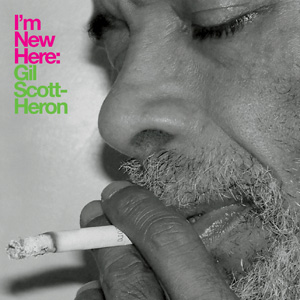
I'm New Here is the 15th and final studio album by American vocalist and pianist Gil Scott-Heron. It was released on February 8, 2010, by XL Recordings and was his first release of original music in 16 years, following a period of personal and legal troubles with drug addiction.
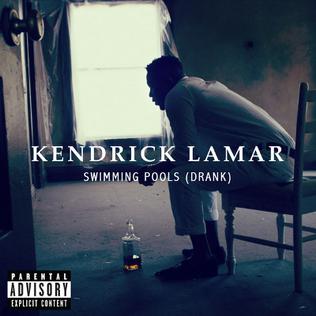
"Swimming Pools (Drank)" is a song by American rapper Kendrick Lamar. It was released on July 31, 2012 as the lead single (second overall) from his major-label debut studio album Good Kid, M.A.A.D City (2012), by Top Dawg, Aftermath and Interscope. The song was written by Lamar and Tyler "T-Minus" Williams, the latter of whom also produced the song. The song, mixed by Dr. Dre and Top Dawg's engineer Derek "MixedByAli" Ali, propelled Lamar to mainstream popularity. The song peaked at number 17 on the US Billboard Hot 100, in its thirteenth week of charting, after gradually climbing up the chart. It debuted on the Hot 100 at number 100 and progressed from number 55 and 32 to its peak. "Swimming Pools (Drank)" also serves as Lamar's first entry on the UK Singles Chart, where it debuted at number 63.

Secrets is a 1978 studio album by American vocalist Gil Scott-Heron and keyboardist Brian Jackson.

1980 is a studio album by American singer-songwriter Gil Scott-Heron and keyboardist Brian Jackson. Their ninth album together, it was recorded from August to October 1979 during a period of creative tension between the two musicians and released in February 1980 by Arista Records.
"Johannesburg" is a song by Gil Scott-Heron and Brian Jackson, with music provided by the Midnight Band. It is the first track on Scott-Heron and Jackson's collaborative album From South Africa to South Carolina, released in November 1975 through Arista Records. The lyrics to "Johannesburg" discussed opposition to apartheid in South Africa, and likened apartheid to the disenfranchisement of African Americans in the United States. The song became a popular hit, reaching No. 29 on the Billboard R&B chart in 1975. According to Nelson George, "Johannesburg" played a role in spreading the cultural awareness of apartheid.



















